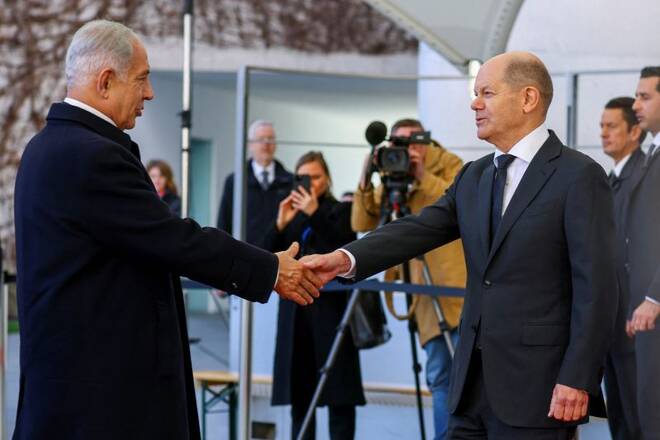Advertisement
Advertisement
Scholz presses Netanyahu on Israeli democracy as judicial row festers
By:
By Andreas Rinke and Matthias Williams BERLIN (Reuters) - Israeli Prime Minister Benjamin Netanyahu visited Berlin for talks on Iran and other issues on Thursday, leaving back home a crisis over a judicial overhaul by his far-right coalition that has triggered mass protests in recent weeks.
By Andreas Rinke and Matthias Williams
BERLIN (Reuters) -German Chancellor Olaf Scholz on Thursday urged Israel to preserve its status as a liberal democracy and expressed concerns to Prime Minister Benjamin Netanyahu about a planned judicial overhaul that has plunged his country into crisis.
Speaking alongside Netanyahu after talks in Berlin, Scholz said he hoped that a compromise on the reforms suggested by Israel’s President Isaac Herzog was not off the table. He softened his criticism by voicing confidence that a solution could be found.
Netanyahu visited Germany while protests erupted once again in Israel over the reforms by his far-right government that have triggered mass unrest in recent weeks.
The Israeli government’s drive to limit Supreme Court powers while increasing its own power in selecting judges has caused alarm at home and abroad about the country’s democratic checks and balances.
While robustly defending the plans, Netanyahu hinted that, in the absence of agreement with the opposition, he might unilaterally review the reforms. Scholz urged parties to find as broad a consensus as possible.
“As partners who share democratic values and as a close friend of Israel, we are following this debate very closely, and I won’t deny, with much concern,” Scholz said.
“Our wish is that our valuable partner Israel remains a liberal democracy,” he said, while stressing Germany did not want to interfere in domestic policy.
Netanyahu called criticism of the plans “absurd”, assuring Scholz that “Israel will remain a liberal democracy”.
“Israel has an independent judiciary but many feel that it is an all-powerful judiciary. An independent judiciary is not an all-powerful judiciary,” he added.
Protesting a red line
Parts of Berlin were cordoned off to traffic as police geared up for protests in the German capital against the Israeli leader’s visit. Netanyahu’s visit began late, and was rescheduled to end earlier than originally planned, amid the constitutional crisis at home and worries that a rare roadside bombing in northern Israel might mark an escalation in violence.
Netanyahu and Scholz jointly visited Berlin’s Gleis 17, or track 17 from where more than 50,000 Jews were deported by train to the Nazi concentration camps between 1941 and 1945.
The sombre ceremony, where they observed a silence and laid wreaths, contrasted with the eruption of new protests in Israel. Flag-waving demonstrators marched through the streets and disrupted traffic, and overnight protesters painted a symbolic red line along roads to the Supreme Court.
Hundreds of protesters also gathered in Berlin in front of Brandenburg Gate, chanting and singing, and holding up signs.
Netanyahu wanted the meeting with Scholz to focus on efforts to prevent Iran from obtaining nuclear weapons. Germany also wanted to discuss the implications of last week’s surprise reconciliation between Iran and Saudi Arabia.
Netanyahu, who is on trial for corruption charges that he denies, says the judicial changes will strengthen democracy and boost business. Members of his coalition driving the overhaul hope to win parliament’s final approval of it by April 2.
Scholz’s government wants to underscore support for Israel and Germany recognising its responsibility for the Holocaust. But Gabriela Heinrich, a senior lawmaker in Scholz’s SPD party said blunt messages were needed.
“Precisely because of our deep friendship with Israel, German politicians are obliged not to mince words when it comes to concerns about the Israeli government’s actions,” Heinrich, the head of the German-Israeli parliamentary group, told Reuters.
The head of the Central Council of Jews in Germany, Josef Schuster, also expressed concern over the judicial overhaul, saying that “a dismantling of democratic structures would also not be acceptable for the Jewish community outside of Israel”.
Thursday’s talks also touched on Germany’s wish to buy the Israeli-made Arrow-3 anti-ballistic missile defence system as part of a European shield that Berlin wants to establish with other countries.
Netanyahu said both countries had agreed on a path forward for the sale, expressing hope that it would be quick. Scholz said such a deal would mark “big progress” on defence cooperation.
(Reporting by Andreas Rinke, Matthias Williams, Miranda Murray, Alexander Ratz, Maayan Lubell, Kirsti Knolle, Laura Alviz, Dan Williams Writing by Matthias WilliamsEditing by Frances Kerry and Christina Fincher)
About the Author
Reuterscontributor
Reuters, the news and media division of Thomson Reuters, is the world’s largest international multimedia news provider reaching more than one billion people every day. Reuters provides trusted business, financial, national, and international news to professionals via Thomson Reuters desktops, the world's media organizations, and directly to consumers at Reuters.com and via Reuters TV. Learn more about Thomson Reuters products:
Advertisement
